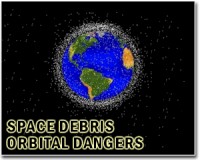 |
Tokyo (UPI) Feb 2, 2011 Japan's space agency says it is teaming up with a maker of fishing nets to create a "space net" for safely collecting orbiting space debris. The Japan Aerospace Exploration Agency and the Nitto Seimo Co. propose launching a satellite, attached to a thin metal net spanning more than a mile, into space before the net is detached and begins to capture space waste while orbiting earth, Britain's Daily Telegraph reported Tuesday. As it collects debris the net would become electrically charged and be attracted back to earth by the planet's magnetic field, causing the net and its contents to safely burn up in the atmosphere. As many as 10 million pieces of "space junk" are estimated to be orbiting Earth at any one time and are a cause for concern because of the potential for collisions with satellites and shuttles. Nitto Seimo, which became famous for inventing the world's first machine to make strong knotless fishing nets in 1925, says it has been researching super-strong space nets for six years. The space net would consist of three layered metal threads, each measuring 1mm diameter (0.03 inch) and intertwined with fibers as thin as human hair. Nitto Seimo says its goal is to have the system developed with two years.
Share This Article With Planet Earth
Related Links Space Technology News - Applications and Research
 Report: Space 'junk' threatens services
Report: Space 'junk' threatens servicesWashington (UPI) Feb 1, 2011 The amount of junk orbiting Earth in space is nearing a "tipping point" that may threaten the $250 billion space services industry, a U.S. report says. A U.S. Defense Department Space Posture Review warned that a single collision between two satellites or large pieces of "space junk" could send thousands of pieces of debris spinning into orbit, each capable of destroying further satelli ... read more |
|
| The content herein, unless otherwise known to be public domain, are Copyright 1995-2010 - SpaceDaily. AFP and UPI Wire Stories are copyright Agence France-Presse and United Press International. ESA Portal Reports are copyright European Space Agency. All NASA sourced material is public domain. Additional copyrights may apply in whole or part to other bona fide parties. Advertising does not imply endorsement,agreement or approval of any opinions, statements or information provided by SpaceDaily on any Web page published or hosted by SpaceDaily. Privacy Statement |